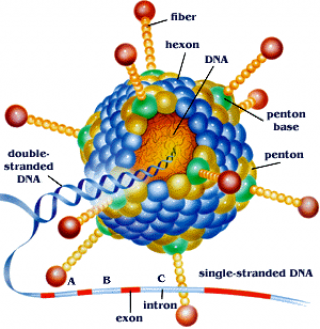Vascular Endothelial Growth Factor (VEGF) is a protein which causes blood vessels to dilate and new blood vessels to be formed. In normal pregnancies the uterine arteries, which supply the womb with blood, relax and dilate so blood can flow easily to the placenta. One of the things that causes this is VEGF produced by the placenta and released into the mother’s blood. Studies have shown that in Fetal Growth Restriction (FGR) there is reduced blood flow to the womb (1) and there are also lower levels of VEGF in the maternal blood (2, 3).
Studies in pregnant women have been performed over the last 15 years by researchers at EGA Institute for Women's Health, and Cardiovascular Medicine, and the Rowett Institute of Nutrition and Health at University of Aberdeen, together with Trizell Limited, formerly Ark Therapeutics. They identified that maternal blood flow to the placenta could be increased both short term and long term in normal pregnancies by delivering an adenoviral vector gene medicine containing the Vascular Endothelial Growth Factor (VEGF) to the uterine arteries (4, 5, 6). There was evidence of new vessel formation in the uterine arteries in association with the VEGF protein, and the uterine arteries were more relaxed and less constricted. There were increased levels in the uterine arteries of a protein called nitric oxide synthase, which is fundamentally important in maintaining blood flow in arteries (4, 5, 6).

In growth restricted pre-clinical pregnancies the adenoviral vector VEGF gene medicine safely increased fetal growth and birthweight (7, 8, 9, 10), and improved long term outcomes. So far the experiments have shown no harm to the mother, fetus or neonate from the therapy and have found no evidence of it crossing the placenta (7, 8, 9, 10, 11).
REFERENCES
- Konje JC, Howarth ES, Kaufmann P, Taylor DJ. Longitudinal quantification of uterine artery blood volume flow changes during gestation in pregnancies complicated by intrauterine growth restriction. British Journal of Obstetrics and Gynaecology 2003;110:301-5.
http://www.ncbi.nlm.nih.gov/pubmed/12628272 PMID:12628272 - Savvidou MD, Yu CK, Harland LC, Hingorani AD, Nicolaides KH. Maternal serum concentration of soluble fms-like tyrosine kinase 1 and vascular endothelial growth factor in women with abnormal uterine artery Doppler and in those with fetal growth restriction. Am J Obstet Gynecol 2006 Dec;195(6):1668-73.
http://www.ncbi.nlm.nih.gov/pubmed/16643817 PMID:16643817 - Bersinger NA, Odegard RA. Serum levels of macrophage colony stimulating, vascular endothelial, and placenta growth factor in relation to later clinical onset of pre-eclampsia and a small-for-gestational age birth. Am J Reprod Immunol 2005 Aug;54(2):77-83. http://www.ncbi.nlm.nih.gov/pubmed/16105099 PMID:16105099
- David AL, Torondel B, Zachary I, Wigley V, Abi-Nader K, Mehta V, et al. Local delivery of VEGF adenovirus to the uterine artery increases vasorelaxation and uterine blood flow in the pregnant sheep. Gene Therapy 2008;15:1344-50.
http://www.ncbi.nlm.nih.gov/pubmed/18563186 PMID: 18563186 - Mehta V, Abi-Nader KN, Peebles DM, Benjamin E, Wigley V, Torondel B, Filippi E, Shaw SW, Boyd M, Martin J, Zachary I, David AL. Long- term increase in uterine blood flow is achieved by local overexpression of VEGF-A165 in the uterine arteries of pregnant sheep. Gene Therapy. 2012 Sep;19(9):925-35. doi: 10.1038/gt.2011.158. Epub 2011 Oct 20.
http://www.ncbi.nlm.nih.gov/pubmed/22011641. PMID:22011641 - Mehta V, Abi Nader K, Shangaris S, Shaw SWS, Filippi E, Benjamin E, Boyd M, Peebles DM, Martin JF, Zachary I, David AL. Local over-expression of VEGF-DDNDC in the uterine arteries of pregnant sheep results in long-term changes in uterine artery contractility and angiogenesis. PloS One 2014 Jun 30;9(6):e100021
https://pubmed.ncbi.nlm.nih.gov/24977408/ PMID: 24977408 - Carr DJ, Wallace JM, Aitken RP, Milne JS, Mehta V, Martin JF, Zachary IC, Peebles DM, David AL. Uteroplacental adenovirus vascular endothelial growth factor gene therapy increases fetal growth velocity in growth-restricted sheep pregnancies. Hum Gene Ther. 2014 Apr;25(4):375-84.
https://www.ncbi.nlm.nih.gov/pmc/articles/PMC3997090/ PMID: 24593228 - Carr DJ, Wallace JM, Aitken RP, Milne JS, Martin JF, Zachary IC, Peebles DM, David AL. Peri- and postnatal effects of prenatal adenoviral VEGF gene therapy in growth-restricted sheep. Biology of Reproduction 2016;94:142,1-12
https://academic.oup.com/biolreprod/article/94/6/142,%201-12/2863976
PMID: 27103444 - Swanson AM, Rossi, CA, Ofir K, Mehta V, Boyd M, Barker H, Ledwozyw A, Vaughan O, Martin J, Zachary I, Sebire N, Peebles DM, David AL. Maternal therapy with Ad.VEGF-A165 increases fetal weight at term in a guinea pig model of fetal growth restriction. Human Gene Therapy 2016 Dec;27(12):997-1007. https://pubmed.ncbi.nlm.nih.gov/27530140/ PMID: 27530140
- Vaughan OR, Rossi CA, Ginsberg Y, White A, Hristova M, Sebire NJ, Martin J, Zachary IC, Peebles DM, David AL. Perinatal and long term effects of maternal uterine artery adenoviral VEGF-A165 gene therapy in the growth restricted guinea pig fetus. Am J Physiol Regul Integr Comp Physiol. 2018;315:R344-R353
https://pubmed.ncbi.nlm.nih.gov/29847165/ PMID: 29847165 - Desforges M, Rogue AR, Pearson N, Rossi C, Olearo E, Forster R, Lees M, Sebire N, Greenwood S, Sibley C, David AL*, Brownbill P*. In vitro human placental studies to support an adenovirus-mediated VEGF-DΔNΔC maternal gene therapy for the treatment of severe early-onset fetal growth restriction. Human Gene Therapy Clinical Development. 2018;29:10-23
https://pubmed.ncbi.nlm.nih.gov/29228803/ PMID: 29228803
 Close
Close

